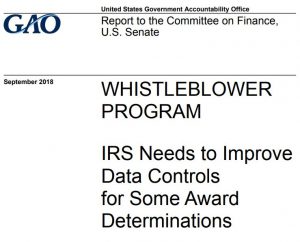 The IRS might be hampering its own whistleblower program by not implementing policies and procedures to incentivize whistleblower rewards. Since 2007, the IRS Whistleblower Program has helped collect $3.6 billion, from which whistleblowers received anywhere from 15 percent to 20 percent of the proceeds of an individual funds recovery.
The IRS might be hampering its own whistleblower program by not implementing policies and procedures to incentivize whistleblower rewards. Since 2007, the IRS Whistleblower Program has helped collect $3.6 billion, from which whistleblowers received anywhere from 15 percent to 20 percent of the proceeds of an individual funds recovery.
The problem, according to the Government Accountability Office (GAO), is that the form the IRS uses to collect data – upon which award amounts for credible whistleblowers is supposed to be determined – has not been updated to actually capture the data accurately or implement recent Congressional reforms. This, in turn, has led to awards not being issued in credible cases and has possibly discouraged others from even coming forward.
The GAO wrote that:
For the IRS whistleblower program to be successful, whistleblowers need to have confidence in the program’s processes and outcomes, including paying awards when a whistleblower’s information is used. However, according to whistleblower attorneys we spoke with, this policy of award exclusions may have discouraged other whistleblowers with significant information on [foreign account] reporting and tax noncompliance from coming forward.
In February 2018, Congress changed the law to require the IRS to include penalties for foreign bank account reporting violations when the agency calculates whistleblower awards. However, the agency has “not yet fully changed some of the whistleblower program’s policies and procedures to reflect” the new law,” according to the report.
In recent years, the IRS argued in court for narrowing the scope of the criminal and civil codes to which whistleblowers can cite to qualify for reward amounts, which are typically determined by interest, penalties, criminal fines, and forfeitures. Congress took a contrary tact and enforced broader eligibility criteria under the 2018 Bipartisan Budget Act in order to incentivize IRS whistleblowers.
The failure to update the form has led to a significant number of cases where the whistleblower’s actual role was not clear. The GAO identified 28 such cases from 2012-2017 in which penalties of nearly $11 million were recovered but no rewards paid out.
Hopefully, the IRS Whistleblower Office will heed the GAO’s recommendation that the IRS modify its forms to clarify the whistleblower’s role in recovering funds, and that there be improved policies and procedures to make sure that such vital data is collected and acted upon.
Click here to review the entire report.


